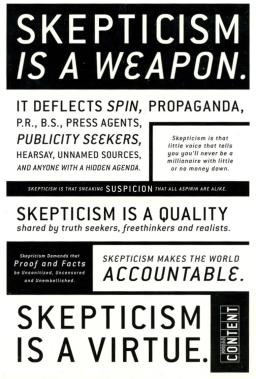 About one month ago (more or less), I sent this to NPR’s series “This I Believe”. We should see if they like it or not soon… The image is from a postcard I picked up in some bar in Seattle. I wish they had made a poster-sized version of it!
About one month ago (more or less), I sent this to NPR’s series “This I Believe”. We should see if they like it or not soon… The image is from a postcard I picked up in some bar in Seattle. I wish they had made a poster-sized version of it!
When I was in my first year of college, my philosophy professor asked me “If the Church asked you to detain this person, would you do it?” My classmates were dismayed when I answered “Yes.” He then asked “Why?” I said “If the Church asks, they must have a good reason.” He knew my background and was trying to make the point that all it takes for atrocities to happen is for otherwise good people to blindly follow those in authority.
However, it wasn’t until a couple of years later, when I was living in the Basque region of Spain, that I had an epiphany while attending Mass in the Basque language. I understood nothing and, at the same time, everything. I didn’t understand a word, but I still followed everything. It was then that I realized that the ritual of Mass wasn’t something that I ever thought about, it was something that I just did because I always had. I had never thought about why.
At the same time, I was in the middle of my studies in physics, and, with time, the scientific approach to understanding the world became much more attractive to me. As a result, I’ve come to believe that a skeptical view of the world is best. To me, being skeptical means to find my own way in the world and not rely on someone else to tell me what to believe. It means to question why. To be a skeptic means to not take anything on faith, to ensure that all possible explanations have been explored and either eliminated or supported by the evidence.
I believe that the world would be a better place if we were all just a bit more skeptical. In my personal life, skepticism is my only tool for sorting out the truths from the half-truths I am constantly bombarded with by advertisers, politicians and religious leaders. I believe that for democracy to function, I, as a citizen, must question what I am told, must question authority at all levels. I must demand that my leaders support claims with evidence and are held accountable when the evidence does not support their assertions. When leaders go unquestioned, unchecked – when I blindly accept what they tell me – freedom is lost and democracy is put at risk.
Skepticism is essential for the continued health and survival of any democracy. Thomas Jefferson said a little revolution now and then is good for democracy. Indeed, revolution has been built into our system via regular elections. If my leaders perform poorly, I have the power to overthrow them. But, it is only by being skeptical of my leaders, by questioning and examining what they tell me, that I can decide if they are acting in my best interests. Being skeptical is the only way I can determine whether my leaders are honest. I believe that it is my duty, as a citizen, to be a skeptic.
Great read!
Do you subscribe to the skeptics guide to the universe podcast? You might like it!
I don’t. I do get the eSkeptics newletter, but to be honest, I don’t make much time to read it. But, I’ll try to check out the podcast, it sounds interesting.